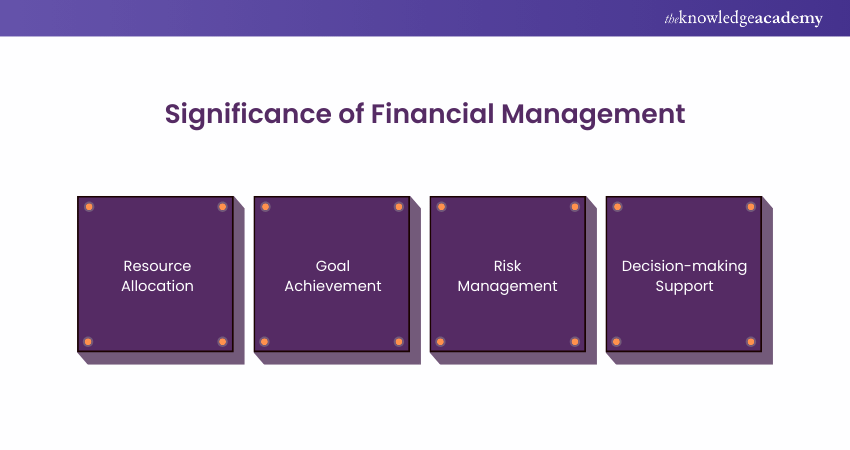We may not have the course you’re looking for. If you enquire or give us a call on + 800 908601 and speak to our training experts, we may still be able to help with your training requirements.
Training Outcomes Within Your Budget!
We ensure quality, budget-alignment, and timely delivery by our expert instructors.

Financial Management acts as the backbone of any successful organisation, ensuring that resources are efficiently utilised and goals are met effectively. But what are the key Principles of Financial Management? Or are you leveraging these Principles to maximise your organisation’s financial health? In this blog, we will explore those essential Financial Management Principles that every business leader should know.
Ranging from forecasting and budgeting to risk management and investment strategies, these Principles provide a comprehensive framework for sound financial decision-making. Dive in and uncover the secrets to financial success!
Table of Contents
1) Importance of Financial Management
2) Essential Principles of Financial Management
a) Clear Financial Goals and Objectives
b) Budgeting and Planning
c) Efficient Cash Flow Management
d) Strategic investments
e) Cost Control and Expense Management
f) Debt Management
g) Risk Management and Insurance
h) Financial Reporting and Analysis
i) Compliance With Regulatory Requirements
j) Continuous Monitoring and Adaptation
3) Conclusion
Importance of Financial Management
Financial Management is vital in the success and sustainability of any organisation. The following are the key reasons highlighting the importance of Financial Management:

1) Financial Management helps in allocating resources efficiently. It ensures that funds are directed to areas where they can generate the highest returns. This helps contribute to the overall growth of the organisation.
2) Clear financial goals and objectives are crucial for the success of a business. Financial Management provides the framework for setting and achieving these goals, aligning them with the broader mission and vision of the organisation.
3) Financial Management involves assessing and mitigating risks. This includes identifying potential financial risks, implementing strategies to minimise them, and having contingency plans in place.
4) Sound financial information is essential for effective decision-making. Financial Management provides accurate and timely data. It enables management to make informed choices regarding investments, operations, and strategic initiatives.
Essential Principles of Financial Management
The following are the top 10 Principles of Financial Management that every organisation must know and adhere to:

Principle 1: Clear Financial Goals and Objectives
One of the foundational Principles of Financial Management is setting clear financial goals and objectives. They provide a roadmap for the organisation, offering a clear sense of purpose and direction.
Organisations must adhere to these goals, which should be based on the Specific, Measurable, Achievable, Relevant, and Time-bound (SMART) criteria. By setting well-defined financial goals, businesses can better track their progress and make informed decisions. More importantly, these goals should align seamlessly with the broader objectives of the organisation, whether it be expansion, profitability, or debt reduction.
Principle 2: Budgeting and Planning
The Principle of budgeting and planning is a fundamental aspect of sound Financial Management. It involves the systematic creation and utilisation of financial plans to effectively allocate resources.
Budgets act as comprehensive financial roadmaps, outlining expected revenues and expenses over a specified period. Effective budgeting ensures that financial resources are utilised efficiently. It supports strategic objectives and prevents unnecessary expenditures.
Take the first step towards a brighter future with our Accounting Course - sign up today and dive into a rewarding career!
Principle 3: Efficient Cash Flow Management
Efficient cash flow management stands as one of the key Principles of Financial Management, emphasising the necessity of maintaining a healthy balance between incoming and outgoing funds.
This Principle involves a keen understanding of the timing of cash inflows and outflows. This helps ensure that the organisation has sufficient liquidity to meet its short-term obligations.
Efficient cash flow management goes beyond profitability, focusing on the actual movement of cash within the business. It involves strategic practices such as timely invoicing, prudent inventory management, and negotiating favourable credit terms with suppliers.
Principle 4: Strategic Investments
Strategic investments are integral to Financial Management, emphasising the careful evaluation and allocation of financial resources for optimal returns. Strategic investments involve a systematic approach to identifying opportunities that align with the organisation's goals and risk tolerance.
This Principle encourages a comprehensive risk and return analysis, considering factors such as market trends, potential for growth, and diversification strategies. By making well-informed investment choices, organisations can improve their financial outcomes and position themselves for sustained success.
Sign up for our Quantitative Finance Course and master the art of financial modelling and risk management.
Principle 5: Cost Control and Expense Management
Cost control and expense management focus on the efficient allocation and oversight of financial resources. This Principle involves the identification and monitoring of costs across various business activities.
It emphasises the importance of maintaining a balance between cost efficiency and quality to ensure sustainable operations. Organisations must employ strategies to identify unnecessary expenses, streamline processes, and negotiate favourable terms with suppliers without compromising product or service standards.
Principle 6: Debt Management
Debt management focuses on the strategic use and responsible handling of borrowed funds. This Principle emphasises that organisations must have an in-depth understanding of the different types of debt. They must evaluate the costs and benefits associated with borrowing and implement effective debt repayment strategies. Responsible borrowing ensures that debt is used to finance opportunities that yield positive returns, such as expansion projects or investments in strategic initiatives.
Ready to excel in Financial Modelling? Join our Financial Modelling Training and acquire the skills to navigate complex financial scenarios with confidence.
Principle 7: Risk Management and Insurance
The Principle of risk management and insurance highlights the significance of proactively identifying, assessing, and mitigating potential financial risks. This Principle involves a systematic approach to recognising various risks, including market fluctuations, operational challenges, and unforeseen events, and implementing strategies to minimise their impact.
Insurance plays a key role in this Principle, giving a financial safety net against potential losses. Businesses must conduct thorough risk assessments, develop risk mitigation strategies, and ensure appropriate insurance coverage to protect against uncertainties.
Principle 8: Financial Reporting and Analysis
Financial reporting and analysis are integral Principles of Financial Management, focusing on the accurate and transparent communication of an organisation's financial performance. These Principles involve the timely preparation and dissemination of financial statements, that include income statements, cash flow statements and balance sheets. Financial analysis complements this process by interpreting these statements, assessing trends, and extracting insights to guide decision-making.
Principle 9: Compliance with Regulatory Requirements
The Principle of compliance with regulatory requirements underscores the necessity of adhering to rules and regulations governing financial practices. This Principle involves a thorough understanding of relevant local, national, and international financial regulations, as well as industry-specific compliance standards. Organisations must establish robust internal controls and processes to ensure compliance, preventing legal issues and reputational damage.
Ready to elevate your Financial Management skills? Join our comprehensive Financial Management Training now!
Principle 10: Continuous Monitoring and Adaptation
Continuous monitoring and adaptation are dynamic and essential components of effective Financial Management. It emphasises the need for ongoing vigilance, evaluation, and adaptation of financial strategies to align with changing business environments.
Continuous monitoring involves regularly assessing financial performance, tracking key metrics, and comparing actual outcomes with planned objectives. This Principle encourages organisations to stay agile and responsive to emerging trends, market fluctuations, and internal changes.
Conclusion
Incorporating these 10 essential Principles of Financial Management can transform your financial strategy. By mastering these fundamentals, you can secure your financial future and unlock new opportunities. Start implementing these Principles today and watch your financial landscape flourish!
Take the initial step towards becoming a financial modelling expert – join our Financial Modelling Course and elevate your career!
Frequently Asked Questions

The principal goal of Financial Management is to maximise shareholder wealth by ensuring efficient allocation of resources, profitability, and sustainable growth.

The main characteristics of Financial Management include planning, organising, controlling, and monitoring financial resources to gain organisational objectives, ensuring financial stability and compliance.

The Knowledge Academy takes global learning to new heights, offering over 30,000 online courses across 490+ locations in 220 countries. This expansive reach ensures accessibility and convenience for learners worldwide.
Alongside our diverse Online Course Catalogue, encompassing 17 major categories, we go the extra mile by providing a plethora of free educational Online Resources like News updates, Blogs, videos, webinars, and interview questions. Tailoring learning experiences further, professionals can maximise value with customisable Course Bundles of TKA.

The Knowledge Academy’s Knowledge Pass, a prepaid voucher, adds another layer of flexibility, allowing course bookings over a 12-month period. Join us on a journey where education knows no bounds.

The Knowledge Academy offers various Accounting & Finance Trainings, including the Payroll Course, Book Keeping Course, and QuickBooks Training. These courses cater to different skill levels, providing comprehensive insights into Finacial Modelling Job Description.
Our Business Skills Blogs cover a range of topics related to Financial Management, offering valuable resources, best practices, and industry insights. Whether you are a beginner or looking to advance your Business skills, The Knowledge Academy's diverse courses and informative blogs have got you covered.
Upcoming Accounting and Finance Resources Batches & Dates
Date
 Financial Management Course
Financial Management Course
Fri 3rd Jan 2025
Fri 28th Mar 2025
Fri 23rd May 2025
Fri 4th Jul 2025
Fri 5th Sep 2025
Fri 24th Oct 2025
Fri 5th Dec 2025







 Top Rated Course
Top Rated Course



 If you wish to make any changes to your course, please
If you wish to make any changes to your course, please


